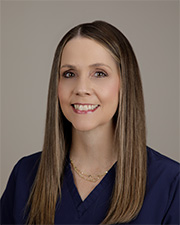Profiles in Caring: Two Nurse Navigators Guide Patients Through Their PAS Journey
 Holly Howington, BSN, RNC-OB
Holly Howington, BSN, RNC-OB
Clinical Manager, OB/GYN Continuity Clinic
Department of Obstetrics, Gynecology, and Reproductive Sciences
McGovern Medical School at UTHealth
In addition to her experience on the outpatient side, Holly Howington brings to the table 20 years of nursing practice on the inpatient side at Children’s Memorial Hermann Hospital, working with Sandra Uribe. The two bridge the gap between inpatient and outpatient care for high-risk mothers.
“When a mother is referred to us with placenta accreta, I personally call her and write her intake history,” Howington says. “I schedule her physician appointments, which are urgent, and make sure she sees the right doctor on the right day. These are patients who were given a frightening diagnosis and transferred from a place where they were comfortable to unfamiliar territory. Many patients live far away, and they typically have other children. Often their parents or other family members who might help are not nearby. The medical aspect is scary, and the logistics of so many appointments have to be worked out. We deliver accretas early so they know they will leave their baby in the NICU. This is likely the scariest time they’ve ever experienced, so I focus on building a relationship of trust with them. Because Sandra and I see and talk with them so often, we pick up on the stressors in their lives, and we get to know them as people instead of as placenta accreta patients. My role is to keep a close connection with all members of the care team to keep the process streamlined for the patient. Together, Sandra and I give them VIP treatment.”
In the process, Howington assesses everything in their lives that will affect their care and their outcomes. “After many years in nursing management, this position allows me to get back to the patient and treat her holistically,” she says. “When you care for a patient throughout the pregnancy who has now delivered and waited six weeks to have a hysterectomy and it’s done, it’s a great sense of accomplishment for everyone on the team. A healthy mom and a healthy baby is our ultimate goal.”
One in 272 births is an accreta, according to the National Accreta Foundation (NAF). “I may see no placenta accreta cases at the Continuity Clinic for a couple of weeks and then in another two weeks’ time, we’ll be planning for three deliveries,” she says. “It’s estimated by the NAF that the incidence of accretas has quadrupled since the 1980s because of the increase in the number of C-sections, which is a risk factor for accreta.”
Uribe and Howington have known each other for more than 20 years. “We’ve been coordinating together forever to solve problems and handle patient care,” Howington says. “I was a charge nurse, and she was my manager. Sandra sets up the multidisciplinary meetings with all the physicians to coordinate care and develop a plan for delivery. We communicate with each other throughout the pregnancy to stay in tune with our patients. To provide comprehensive care for these very high-risk patients, we bring the entire care team, including maternal-fetal medicine, gynecologic oncology, and anesthesia, to the patients in one clinic so that they have only one appointment. Our team is accustomed to working together, and it’s easy to collaborate with people when you have a solid history of delivering care.”
What motivates Howington? “Being able to make a huge difference in the lives of the patients we see,” she says. “It’s truly an honor to help a mom who fears for her life and her baby’s life and walk them through the journey until they are both safely out on the other side.”
 Sandra Uribe, RN, BSN
Sandra Uribe, RN, BSN
Maternal-Fetal Medicine Navigator
Sandra Uribe is the first nurse in a family of physicians. “Being a nurse in a family of physicians is not about being an outlier. It’s about completing the picture of comprehensive patient care,” she says. “Every role, whether diagnosing, treating, or nurturing, is crucial in the tapestry of healing.”
The capacity to handle interpersonal relationships judiciously and empathetically has allowed Uribe to excel at caring for high-risk maternal-fetal medicine patients, particularly those diagnosed with placenta accreta. They deal with fear throughout their pregnancies as they approach the possibility of a traumatic delivery.
“Almost all pregnant women deal with the fear of delivering a premature baby or a baby with unforeseen complications,” Uribe says. “A mother diagnosed on the placenta accreta spectrum is one whose pregnancy journey is marked with concern for her baby and also that she herself might not survive such a high-risk pregnancy. This is a diagnosis that often affects the entire family, in addition to the mother. These patients and families need extra care, expertise, undivided attention, and support. I pride myself on having the sensitivity and emotional empathy to help families heal emotionally and physically.”
Uribe is the constant presence in the hospital, rounding on patients daily as the nurse navigator for the maternal-fetal medicine (MFM) team. “Because we’re an academic teaching hospital, attending physicians change frequently, and every month we have a new rounding fellow and residents rotating on the MFM service. I stay connected to our patients and introduce them to the newest members of their health care team. I also ensure that we follow the MFM team’s original care plan unless changes are medically warranted.”
A multidisciplinary team develops the plan of care and keeps the referring primary care obstetrician informed of patient condition and status. Multidisciplinary meetings are individualized to each patient with the three options for delivery and care offered at UTHealth Houston and Children’s Memorial Hermann Hospital: cesarean hysterectomy with bilateral salpingectomy; leaving the placenta in situ with delayed hysterectomy; and leaving the uterus and placenta in situ for patients who opt for future fertility.
“We use a well-orchestrated approach for families who strongly desire future fertility, as well as delayed hysterectomy to minimize blood loss during delivery,” she says. “The most important thing for high-risk obstetrical patients is to plan their delivery in a multi-specialty tertiary care hospital such as ours. We want them to know that we will do everything we can to optimize the outcome and the patient experience. At Children’s Memorial Hermann Hospital, Memorial Hermann-Texas Medical Center, and UTHealth Houston we have all subspecialties under the same roof.”
Uribe has a huge passion for improving the care of mothers and babies, in addition to extended training in dealing with traumatic events and bereavement. “Many of these families are grieving the loss of a ‘routine’ pregnancy. One of our most important roles is to support our patients and families through this emotional journey,” she says. “My role stops when high-risk patients leave the hospital, and Holly Howington picks up on the outpatient clinical side. She’s the UTHealth Houston piece that complements my Memorial Hermann piece. Together, we provide complete end-to-end high-risk nursing care.”
The OB/GYN Continuity Clinic staff dedicates Monday and Thursday to high-risk patients. To refer a patient, call 832-325-7200.